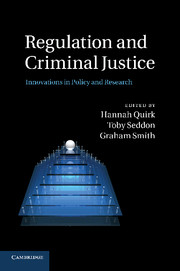Book contents
- Frontmatter
- Contents
- List of figures and tables
- Notes on contributors
- Foreword
- Acknowledgements
- 1 Regulation and criminal justice: exploring the connections and disconnections
- PART I Regulation and criminal justice: framing the debate
- PART II Criminal justice as regulation: responsivity, alternatives and expansion
- PART III Regulation of criminal justice: monitoring, effectiveness and accountability
- 10 The regulation of criminal justice: inspectorates, ombudsmen and inquiries
- 11 Rethinking prison inspection: regulating institutions of confinement
- 12 Regulating democracy: justice, citizenship and inequality in Brazil
- Index
- References
10 - The regulation of criminal justice: inspectorates, ombudsmen and inquiries
Published online by Cambridge University Press: 04 February 2011
- Frontmatter
- Contents
- List of figures and tables
- Notes on contributors
- Foreword
- Acknowledgements
- 1 Regulation and criminal justice: exploring the connections and disconnections
- PART I Regulation and criminal justice: framing the debate
- PART II Criminal justice as regulation: responsivity, alternatives and expansion
- PART III Regulation of criminal justice: monitoring, effectiveness and accountability
- 10 The regulation of criminal justice: inspectorates, ombudsmen and inquiries
- 11 Rethinking prison inspection: regulating institutions of confinement
- 12 Regulating democracy: justice, citizenship and inequality in Brazil
- Index
- References
Summary
This chapter explores the particular difficulties of regulating the criminal justice system. In many ways, it is less a system than a group of overlapping organizations with a common population, but not necessarily congruent goals. These tensions are reflected in the arrangements for regulating the different parts of the system.
This chapter is written entirely from a practitioner's point of view, and focuses on the inspection of places of custody, which is the most extreme sanction the state can impose. It draws strongly from my experiences and perceptions of nearly eight years as HM Chief Inspector of Prisons, and of inspecting a particular, and the most extreme, form of the regulation of behaviour through criminal sanction – imprisonment. I look at that role in the context of the inspection of criminal justice as a whole in England and Wales. I examine recent attempts by the government to create a single inspectorate and explain why I believe that this is inappropriate. I also look at the other mechanisms for redress and monitoring in England and Wales and conclude with some reflections on methods of inspecting and monitoring places of custody in other countries, specifically the United States and France.
There are five criminal justice inspectorates in England and Wales: the Inspectorates of Constabulary, Crown Prosecution Service, Courts Administration, Probation and Prisons. Their areas of responsibility are self-evident but they are differently constituted and have varying functions.
- Type
- Chapter
- Information
- Regulation and Criminal JusticeInnovations in Policy and Research, pp. 237 - 260Publisher: Cambridge University PressPrint publication year: 2010
References
- 2
- Cited by



